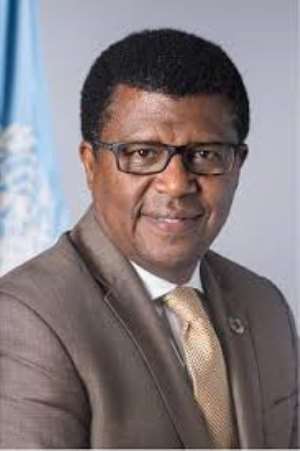
Mr Dereje Wordofa, the Deputy Executive Director, in charge of Programmes at the United Nations Population Fund (UNFPA), has paid separate courtesy calls on the Ministers of Foreign Affairs and the Gender, Children and Social Protection, respectively.
Both Ministers expressed their appreciations for the visit, and spoke well about the continuous support of the UNFPA towards Ghana's development.
Ms Shirley Ayorkor Botcway, the Minister of Foreign Affairs, acknowledged the tremendous collaborative contributions of the UNFPA in addressing the needs of the youth, especially in areas such as Reproductive Health, including Family Planning services.
She mentioned skill training programmes that sought to provide training for young females and others to protect their human rights against forced marriages, harmful cultural practices, such as Female Genital Mutilation and rape.
Mr Wordofa is in Ghana to attend the African Union Meeting to review the implementation of the Addis Ababa Declaration on Population and Development five years after it adoption by African Heads of State.
He explained that the UNFPA had a deliberate Plan to provide the youth with comprehensive sexuality education and to protect young females' from unwanted pregnancies, abortions, maternal mortality, sexually Transmitted Infections, including HIV, cancers, and ensure quality nutrition to ensure a high school retention rate.
He however said the huge nature of these problems required a collaborative effort with the government to mobilise the needed resources to achieve the Sustainable Development Goals.
Ms Leticia Adelaide Appiah, the Minister of Gender, Children and Social Protection designate, recounted how the UNFPA had worked with the Ministry to achieve various successes in female education, child care and skills training for the underprivileged, particularly female head porters (Kayaye), and appealed to the Organisation for more support in addressing the challenge of 'streetism'.
She noted that once children were on the streets, it was difficult to achieve successes and targets in reproductive health, the SDGs, gender equality or eliminate poverty.
Mr Wordofa urged government of Ghana to set aside a funding budget for the procurement of contraceptives for family planning services, and asked that such issues be raised high at Cabinet and Parliamentary levels to help sustain the progress made so far in addressing the health needs of young people.
He said good population management was key to eliminating poverty and ensure that girls lived long in school without any reproductive obstacles.
Mr Wordofa later joined the UNFPA Ghana team to visit some project sites at Agbobloshie and the Ussher Polyclinic at James town, both in Accra, where the organisation has adopted a school, which housed the children of 'Kakaye'.
It also visited the Kayaye Youth Association Central Office, where an integrated module programme for ending child marriage among these group, provided varied services including community health outreach.
Under PAYDP the UNFPA Ghana Office contribute to addressing child marriage through the provision of technical and financial support for policy advocacy, knowledge management and service delivery interventions.




 Lay KPMG audit report on SML-GRA contract before Parliament – Isaac Adongo tells...
Lay KPMG audit report on SML-GRA contract before Parliament – Isaac Adongo tells...
 Supervisor remanded for stabbing businessman with broken bottle and screwdriver
Supervisor remanded for stabbing businessman with broken bottle and screwdriver
 NDC watching EC and NPP closely on Returning Officer recruitment — Omane Boamah
NDC watching EC and NPP closely on Returning Officer recruitment — Omane Boamah
 Your decision to contest for president again is pathetic – Annoh-Dompreh blasts ...
Your decision to contest for president again is pathetic – Annoh-Dompreh blasts ...
 Election 2024: Security agencies ready to keep peace and secure the country — IG...
Election 2024: Security agencies ready to keep peace and secure the country — IG...
 People no longer place value in public basic schools; new uniforms, painting wil...
People no longer place value in public basic schools; new uniforms, painting wil...
 'Comedian' Paul Adom Otchere needs help – Sulemana Braimah
'Comedian' Paul Adom Otchere needs help – Sulemana Braimah
 Ejisu by-election: Only 33% of voters can be swayed by inducement — Global InfoA...
Ejisu by-election: Only 33% of voters can be swayed by inducement — Global InfoA...
 Minority will expose the beneficial owners of SML, recover funds paid to company...
Minority will expose the beneficial owners of SML, recover funds paid to company...
 Prof. Opoku-Agyemang has ‘decapitated’ the NPP’s strategies; don’t take them ser...
Prof. Opoku-Agyemang has ‘decapitated’ the NPP’s strategies; don’t take them ser...
